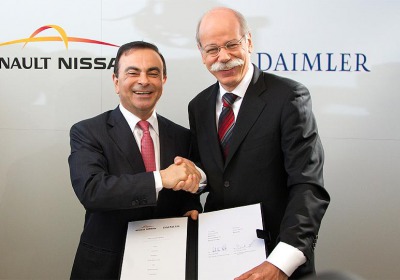Daimler, Renault-Nissan announce alliance
Wed, 07 Apr 2010
Daimler and Renault-Nissan unveiled the details of an international alliance on Wednesday in a landmark collaboration designed to fortify the three historic automakers by sharing technology and reducing costs around the world.
AutoWeek first broke news of the deal last week.
Renault-Nissan and Daimler will work together on several specific projects, including small cars, engines and commercial vehicles. The deal will also bolster their efforts to produce efficient vehicles in the face of stricter emissions and fuel standards around the world.
“It's about operations, it's about concrete projects,” Daimler chairman Dieter Zetsche said.
This stands in contrast to the ill-fated merger of Daimler-Benz and Chrysler, which unwound with little benefit to either company and left the American automaker greatly weakened.
While that tie-up was a culture clash, Renault-Nissan chairman Carlos Ghosn said his 11-year-old alliance has been open to different ideas, which has helped it endure.
“I'm sure that the German approach is going to be complementary to the French and the Japanese,” he said.
Still, the automakers stand as national symbols and considerable sources of employment in their home countries. They say they will maintain independence and continue to separate their brands. The companies will take small stakes in each other as a symbolic gesture to cement the agreement.
Product collaborations
Daimler and Renault-Nissan will work together on a common architecture for the next-generation of the Smart ForTwo and the Renault Twingo cars, which will be rear-wheel drive.
A new Smart ForFour also will likely come to the United States. The new models will launch starting in 2013 and will have electric versions. They'll be built in Renault factories in France and Slovenia.
Renault will also build a commercial van for Daimler.
Engines
The engine tie-up is expected to help the automakers in areas where they are comparatively weak, with Daimler offering expertise for luxury powertrains while Renault chips in with small-car propulsion.
Daimler will provide four- and six-cylinder engines for Nissan's luxury brand, Infiniti. The companies say Mercedes-Benz is seldom cross-shopped with Infiniti and argue that the deal won't dilute the brands.
Conversely, Daimler gets three- and four-cylinder diesel engines for Mercedes small cars, allowing it a less-expensive source of powertrains and helping Renault utilize excess capacity in its factories.
Implications
The deal signals increased collaboration on a global scale that could also see cost savings in parts and purchasing. It also could raise the leverage of all three companies and position them to take advantage of growth in emerging markets such as China and Brazil, while bolstering their product portfolios for another potential surge in demand for small cars should fuel prices rise again.
Pointing to the most recent crisis, Ghosn said: “The lesson from 2008 to 2009 is you better be global.”
By Greg Migliore

